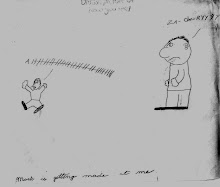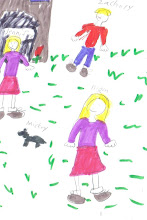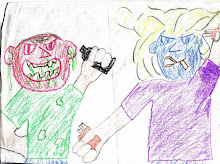By Dara Carlin, M.A.
Domestic Violence Survivor Advocate
Have you ever taken a chance in your life? Has anyone ever assured you of something and then reneged once you held up your end of the bargain? Have you ever been completely betrayed and abandoned by someone you trusted? If you've experienced even one of these, then you have a little idea of what it feels like to be a victim of domestic violence fleeing her abuser with her children. But what do you think happens to those women and children who've escaped an abusive home? They'd probably go to a shelter first, then maybe get some counseling, then divorced, right? What do you think happens to her abuser in the meantime? If he's not court-ordered into therapy or management classes (chances are he's not going to go voluntarily) and even if he did go he'd have to genuinely want to change his ways and take responsibility for the harm he's inflicted on his family. For abusers, this is a tall order and one they're not likely to take because "no one's making HER responsible for anything that happened".
With child custody and visitation issues however, SHE is made as responsible as HIM and the perpetrators just love this set-up; the focus of the court is no longer on the domestic violence that occurred (reasoning that "no marriage = no domestic violence") but is on "the best interests of the child". If the perpetrator hasn't changed his abusive behavior towards his ex-wife and children (and why would he want to change something that works so well for him?) then nothing's changed - the risk for violence and abuse remain - the only thing that's different now is marital status and living arrangements. For many women, this time is more dangerous for them and their children because when the batterer feels that he is losing control he becomes desperate. If he can not access his ex-wife/girlfriend then he knows that the next best thing is to "get to" her through the children and all too often he finds this to be more productive and more entertaining for him. After all, what's the best way to hurt a mother? Through her children!!! Dr. Alina Patterson described the “specific tactics used by abusive individuals to continue controlling their victims after they are no longer present” as Domestic Violence by Proxy.
What is Domestic Violence by Proxy? Simply put, it's the extension of domestic violence beyond the termination of the marriage and/or family. Prior to this, divorced abusers would allege "Parental Alienation" when their ex-wives would report their ongoing abuse or newly initiated abuse against the children to authorities or the family court. “She won’t allow me to see my children! She's turning the kids against me - look, they're even afraid of me! She is alienating me from my children and cutting me out of their lives! All I want to do is be a father to my children.”
The perpetrator's declarations of "Parental Alienation" work like magic for him: his abusive behaviors towards his ex, the children and his court order violations are ignored while the focus becomes the investigation into confirming the mother's use of "Parental Alienation" against him. Many legal and therapeutic professionals think “Ah ha… I have seen this definition before” and comfortingly attribute all the post-decree drama to the bogus "diagnosis" of PAS (Parental Alienation Syndrome) missing the real diagnosis of Domestic Violence by Proxy as described by Dr. Joyanna Silberg, “A batterer with a history of using domestic violence or intimidation uses the child as a substitute when he no longer has access to his victim, the former partner”. Practitioners and service providers take notice: Domestic Violence by Proxy is just as insidious, damaging and potentially life-threatening as domestic violence is!
The smoke screen of PAS was introduced in 1985 by Richard Gardner, a man who openly condoned adult and parental sex with young children. Many of these children who were victims of this flimsy hypothesis are now coming of age and have horrendous stories of abuse. Not only were they tortured at the hands of their own parent but they were further betrayed by the justice system who assigned "supervisors" to ensure their protection from harm.
Jennifer Collins, a young advocate who has survived her father’s severe life threatening abuse as well as the court’s appointed (child) abuse, has researched PAS thoroughly. Jennifer has written an interesting article from a child’s point of view entitled "Clarity on the Parental Alienation Debate From a Child Who Lived Through It" and has also started her own organization CA3 to help children of abuse find their voice like she did. Way to go Jennifer!
Subscribe to:
Post Comments (Atom)











No comments:
Post a Comment